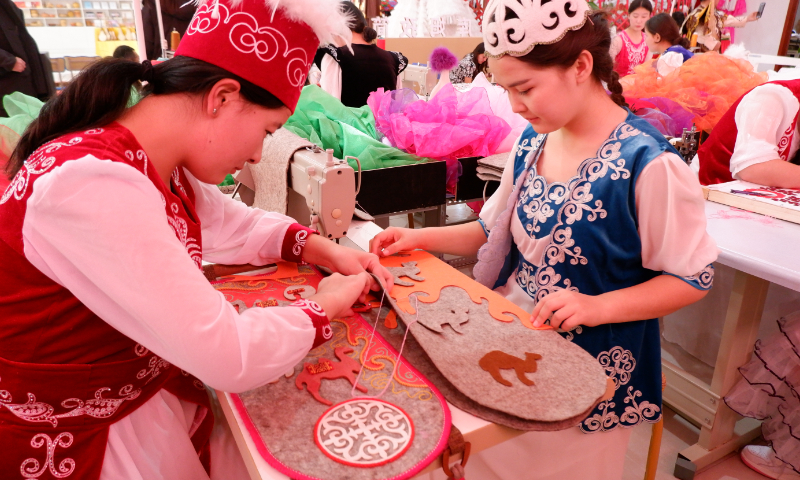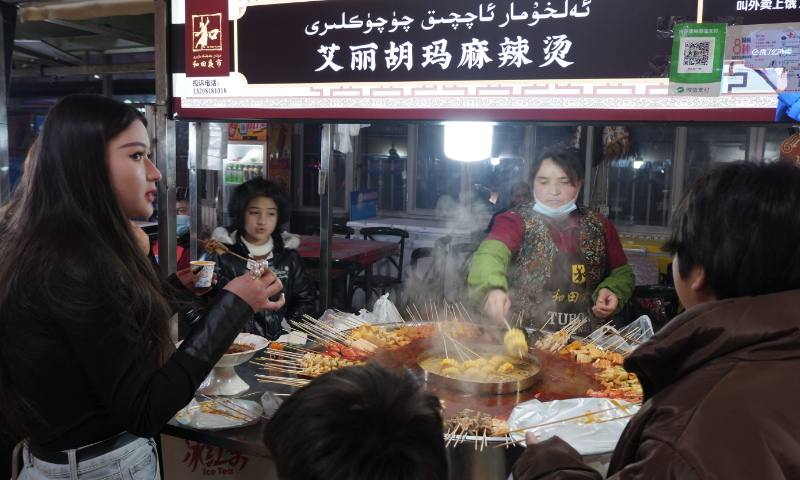IN-DEPTH / IN-DEPTH
GT on the spot: Locals, outsiders work in Xinjiang for diverse opportunities, jointly promoting economic, social devt
Editor's Note:
The diversified development and opportunities in Northwest China's Xinjiang Uygur Autonomous Region have attracted young people from all over the country to settle there.
GT reporters have again traveled to the region. In this fifth installment of a series of articles, GT tells character stories based on ordinary people in Xinjiang who have found opportunities for self-realization and have grasped real happiness.

'My life here is very happy'
Feng Xiaoheng, 40, from Henan, enrolled in Xinjiang University's mechatronics program in 2004.
"When I first came to Urumqi in 2004, the buildings and road conditions here were behind many other cities. At that time, I thought I might not find a suitable job in Xinjiang after graduation," he recalled to the Global Times.
"But after the upgrading of industries and the steady improvement of the economy in Xinjiang, I joined a state-owned enterprise after graduation and have been responsible for project construction in Xinjiang until now."
Now Feng's whole family has settled in Urumqi. "As a 'new Xinjianger,' I have witnessed the tremendous changes that have taken place here. Being able to participate in project construction in Xinjiang is equivalent to contributing to the future development of Xinjiang. Now my family and career are rooted here, and I have realized my life's value here."
Halchem Keram, who is in her 30s, told the Global Times that she used to raise cows and sheep at home while her husband did business elsewhere, but their income was unstable. When their child was 1 year and 8 months old, she decided to go out to work.
Jianying Kangcheng Asset Management Co. provides food production, processing, packaging, distribution, and sales. It is only a few minutes' drive from Halchem's home. Halchem successfully obtained a job opportunity at the company's distribution center, and her son attends kindergarten in the community.
"I work and my child goes to school near our home. I have a stable income every month and can also take care of my family. I think life here is very good now."
Halchem has been working in the company for more than three years. She told the Global Times that the rumors about "forced labor" in Xinjiang from some Western countries are "ridiculous."
"Like everyone else in the world, we voluntarily come out to work for a better life. What's the problem with that? I don't understand why some people would say such things."
Liu Wenbo, the deputy general manager of the company, said in an interview with the Global Times that the company has a total of 248 employees from various ethnic groups, including 143 ethnic minority workers, accounting for about 58 percent, and more than 70 percent are women. Most of them are over 45 years old.
"Local women tend to return to their families after marriage; some work in farming at home, and lack work experience. In order to help them find employment again, we provide labor skills training for them, whether as a pastry chef or a cook. We teach them a skill first and then arrange employment positions for them."

Foreign noises never affect Xinjiang
Chang Jian, director of the Human Rights Research Center at Nankai University, told the Global Times that whether it is the story of Xinjiang locals or outsiders who came to Xinjiang from other parts of the country to study and settle down, it's clear that people of all ethnic groups have achieved prosperity with a sense of unity, cooperation, and promotion of economic and social development.
"This reflects the comprehensive realization of the right to development. Living a good life and improving living standards are the dreams of every household. Every young person wants to make a breakthrough and achieve their longing for a better life through their own efforts," Chang noted.
Due to Xinjiang's unique natural conditions, it faces challenges in improving living conditions, so personal efforts are needed in the process of economic marketization.
In this situation, governments at all levels have taken active measures. For example, they carry out paired assistance, in which many provinces and cities support the construction of various areas in Xinjiang, the Global Times learnt.
For example, Zhongtuo Bio-Technology Co. came to Hami under the background of paired assistance between Henan Province and Hami. The company has established a chain of camel milk acquisition, processing, and sales, which has generated sustainable economic benefits for herders.
Also, for herders who face various uncertainty and risks in camel breeding, the government has formulated and implemented a series of policy subsidies to stabilize their income expectations and stimulate farmers' enthusiasm for breeding.
Chang said that in recent years, there have been many rumors and smears about Xinjiang's social and development situation that seriously deviate from the facts, and what has been seen in reality is that people of all ethnic groups in Xinjiang are full of hope in the process of pursuing and realizing a better life.
The sense of gain, security, and happiness can be seen on local faces, and people have not been disturbed by various foreign noises.
"This determination and confidence comes from the improvement they personally feel in their lives every day, from the tangible gains they have made in their hard work, and from the joy and pride they have in growing and realizing their value," Chang said.
The diversified development and opportunities in Northwest China's Xinjiang Uygur Autonomous Region have attracted young people from all over the country to settle there.
GT reporters have again traveled to the region. In this fifth installment of a series of articles, GT tells character stories based on ordinary people in Xinjiang who have found opportunities for self-realization and have grasped real happiness.

People in Xinjiang enjoy happy and colorful life. Photo: Xu Keyue/GT
'My life here is very happy'
Feng Xiaoheng, 40, from Henan, enrolled in Xinjiang University's mechatronics program in 2004.
"When I first came to Urumqi in 2004, the buildings and road conditions here were behind many other cities. At that time, I thought I might not find a suitable job in Xinjiang after graduation," he recalled to the Global Times.
"But after the upgrading of industries and the steady improvement of the economy in Xinjiang, I joined a state-owned enterprise after graduation and have been responsible for project construction in Xinjiang until now."
Now Feng's whole family has settled in Urumqi. "As a 'new Xinjianger,' I have witnessed the tremendous changes that have taken place here. Being able to participate in project construction in Xinjiang is equivalent to contributing to the future development of Xinjiang. Now my family and career are rooted here, and I have realized my life's value here."
Halchem Keram, who is in her 30s, told the Global Times that she used to raise cows and sheep at home while her husband did business elsewhere, but their income was unstable. When their child was 1 year and 8 months old, she decided to go out to work.
Jianying Kangcheng Asset Management Co. provides food production, processing, packaging, distribution, and sales. It is only a few minutes' drive from Halchem's home. Halchem successfully obtained a job opportunity at the company's distribution center, and her son attends kindergarten in the community.
"I work and my child goes to school near our home. I have a stable income every month and can also take care of my family. I think life here is very good now."
Halchem has been working in the company for more than three years. She told the Global Times that the rumors about "forced labor" in Xinjiang from some Western countries are "ridiculous."
"Like everyone else in the world, we voluntarily come out to work for a better life. What's the problem with that? I don't understand why some people would say such things."
Liu Wenbo, the deputy general manager of the company, said in an interview with the Global Times that the company has a total of 248 employees from various ethnic groups, including 143 ethnic minority workers, accounting for about 58 percent, and more than 70 percent are women. Most of them are over 45 years old.
"Local women tend to return to their families after marriage; some work in farming at home, and lack work experience. In order to help them find employment again, we provide labor skills training for them, whether as a pastry chef or a cook. We teach them a skill first and then arrange employment positions for them."

People in Xinjiang enjoy happy and colorful life. Photo: Xu Keyue/GT
Foreign noises never affect Xinjiang
Chang Jian, director of the Human Rights Research Center at Nankai University, told the Global Times that whether it is the story of Xinjiang locals or outsiders who came to Xinjiang from other parts of the country to study and settle down, it's clear that people of all ethnic groups have achieved prosperity with a sense of unity, cooperation, and promotion of economic and social development.
"This reflects the comprehensive realization of the right to development. Living a good life and improving living standards are the dreams of every household. Every young person wants to make a breakthrough and achieve their longing for a better life through their own efforts," Chang noted.
Due to Xinjiang's unique natural conditions, it faces challenges in improving living conditions, so personal efforts are needed in the process of economic marketization.
In this situation, governments at all levels have taken active measures. For example, they carry out paired assistance, in which many provinces and cities support the construction of various areas in Xinjiang, the Global Times learnt.
For example, Zhongtuo Bio-Technology Co. came to Hami under the background of paired assistance between Henan Province and Hami. The company has established a chain of camel milk acquisition, processing, and sales, which has generated sustainable economic benefits for herders.
Also, for herders who face various uncertainty and risks in camel breeding, the government has formulated and implemented a series of policy subsidies to stabilize their income expectations and stimulate farmers' enthusiasm for breeding.
Chang said that in recent years, there have been many rumors and smears about Xinjiang's social and development situation that seriously deviate from the facts, and what has been seen in reality is that people of all ethnic groups in Xinjiang are full of hope in the process of pursuing and realizing a better life.
The sense of gain, security, and happiness can be seen on local faces, and people have not been disturbed by various foreign noises.
"This determination and confidence comes from the improvement they personally feel in their lives every day, from the tangible gains they have made in their hard work, and from the joy and pride they have in growing and realizing their value," Chang said.

